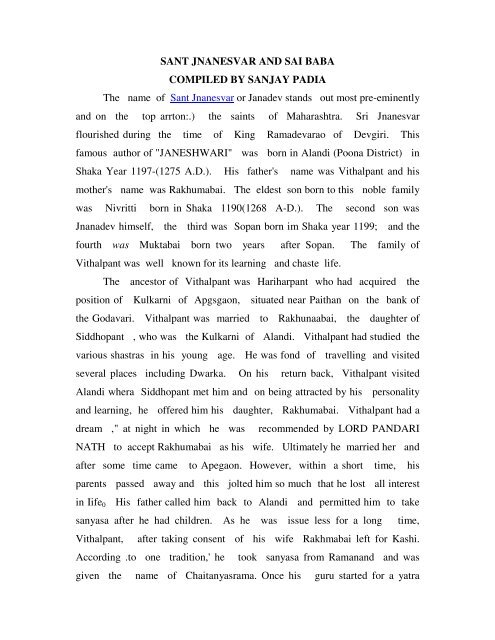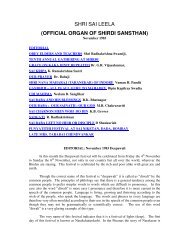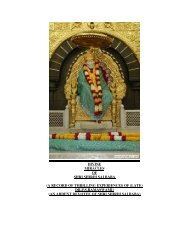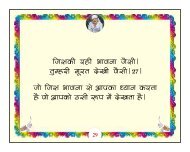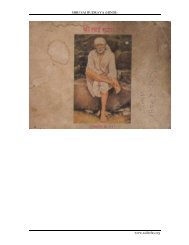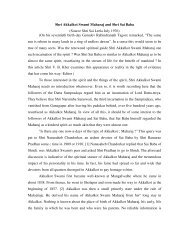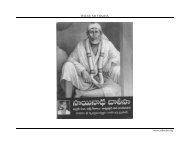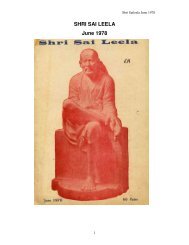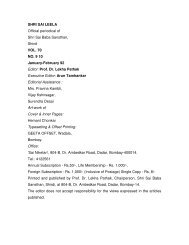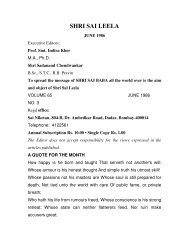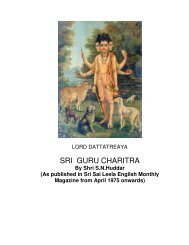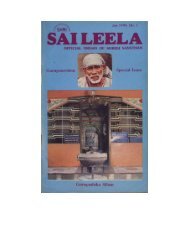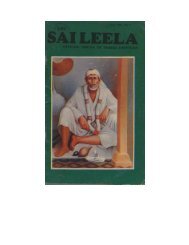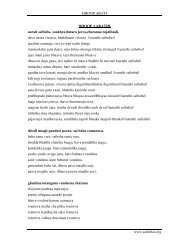SANT JNANESVAR AND SAI BABA COMPILED BY ... - SaiLeelas
SANT JNANESVAR AND SAI BABA COMPILED BY ... - SaiLeelas
SANT JNANESVAR AND SAI BABA COMPILED BY ... - SaiLeelas
You also want an ePaper? Increase the reach of your titles
YUMPU automatically turns print PDFs into web optimized ePapers that Google loves.
<strong>SANT</strong> <strong>JNANESVAR</strong> <strong>AND</strong> <strong>SAI</strong> <strong>BABA</strong><strong>COMPILED</strong> <strong>BY</strong> SANJAY PADIAThe name of Sant Jnanesvar or Janadev stands out most pre-eminentlyand on the top arrton:.) the saints of Maharashtra. Sri Jnanesvarflourished during the time of King Ramadevarao of Devgiri. Thisfamous author of "JANESHWARI" was born in Alandi (Poona District) inShaka Year 1197-(1275 A.D.). His father's name was Vithalpant and hismother's name was Rakhumabai. The eldest son born to this noble familywas Nivritti born in Shaka 1190(1268 A-D.). The second son wasJnanadev himself, the third was Sopan born im Shaka year 1199; and thefourth was Muktabai born two years after Sopan. The family ofVithalpant was well known for its learning and chaste life.The ancestor of Vithalpant was Hariharpant who had acquired theposition of Kulkarni of Apgsgaon, situated near Paithan on the bank ofthe Godavari. Vithalpant was married to Rakhunaabai, the daughter ofSiddhopant , who was the Kulkarni of Alandi. Vithalpant had studied thevarious shastras in his young age. He was fond of travelling and visitedseveral places including Dwarka. On his return back, Vithalpant visitedAlandi whera Siddhopant met him and on being attracted by his personalityand learning, he offered him his daughter, Rakhumabai. Vithalpant had adream ," at night in which he was recommended by LORD P<strong>AND</strong>ARINATH to accept Rakhumabai as his wife. Ultimately he married her andafter some time came to Apegaon. However, within a short time, hisparents passed away and this jolted him so much that he lost all interestin Iife 0 His father called him back to Alandi and permitted him to takesanyasa after he had children. As he was issue less for a long time,Vithalpant, after taking consent of his wife Rakhmabai left for Kashi.According .to one tradition,' he took sanyasa from Ramanand and wasgiven the name of Chaitanyasrama. Once his guru started for a yatra
(pilgrimage) and on his way he visited Alandi and met the wife ofVithalpant Rakhumabai. He blessed her that she would bear children and onher explaining her predicament, he immediately ordered Vithalpant on hisreturn to Kasi) to resume the life of a householder and reprimandedhim for taking permission of his wife and taking sanyasa without havingany progeny. Vithalpant came back as ordered by his guru, stayed with hiswife and had four children as stated above.Jnanadev was a saint of a very high order who was not only anAdvaitic philosopher but had also achieved self-realisation. He was also agreat bhakta and a yogi. There was also a great influence ofNathsampradaya on Jnaneshvar and his family. The original founder of theNath Sampraday a was believed to be Adinath " who is none else thanLORD SANKARA HIMSELF 0 "The first to come after Adinath wasMatsyendranath who was also known as Meenanath and was believed tobe the avatara of Avalokitesvara and the great saint of the Kaulamarga.Apart from the influence of Nath Sampradaya Jnaneshvar also wasinfluenced and inspired by the Upanishads, Gita, Bhagavata, Gaudapadaa: andSankaracharya.The Varkaris also known" as time keeping pilgrims who undertakeVaris (pilgrimages) mostly belong to the lower classes and are opposed to' Brahmin exclusiveness. This sect was founded by Jnaneshvar in the 13thcentury and though Jnanadev Himself did not make converts, He used toregularly visit Pandharpur. These varkaris undertake bi-annual pilgrimagesto the home town of Jnanasvar in Alandi to Pandharpur the home ofLORD VTTlHAL(or Lord Vishnu). These varkaris start from Alandi onevery Jyestha Krishna Paksha 10th and reach Pandharpur on Ashadi Ekadashiwhere a huge fair is held and lakhs of devotees congregate. Similarly, thesecond pilgrimage on foot starts on Ashwin Krishna Paksha 10 and reachesPandharpur on Kartick Eakdashi.
The famous works of Jnaneshvar are His Jaaneshvari, Amritanubhava,Abhangas and Ghangdeva Pasasthi. Of these, the Jnaneshvari is still thebest work in Marathi literature and has been translated into numerouslanguages.Sri Jnaneshvar Maharaj voluntarily given up His body; He had HisJivatsamadhi on the 13th day of the dark half of Kartick in the SakaYear 1218 (1296 A.D.), in Alandi. Three hundred years after His samadhi,Eknath Maharaj once again edited Jnaneshvari after he discovered a largenumber of bad readings in the text. The reedited text was published onKapilashasthi. Eknath to whose credit goes the discovery of Jnaneshvarsamadhi also started the practice of the annual varis or pilgrimages to theshrine of Jnaneshvar at Alandi.BOOK OF SHIRDI ARATIS - SHEJ ARATI.Jnaneshwar Arati' Composed by Shri Rama Janardhan Swami.""Arati Jnaanaraja - mahaa kaivailya tejaa, sevitee saadhusanta - hmanuvedhalaa maazha,- Arati -5.""Lopale jnaane jagin-hita nenetee konee, AvatAra Panduranga - namtteville jnanee,- Arati -""Kanakaache tat kareen - ubhyaa gopikaa naaree, Narada tumbaraho -saamgaayan karee,- Arati -""Pragata guhya bole- vishwa brahmachi kele, Rana Jamardhanee —paayeemasfchak ttevillo,- Arati -English Translation."Oh King of the realm of Knowledge, Jnanaraja, thou art haloedwith surpassing splendour of Kaivalya. Saints and sages adore thee
with their minds fully absorbed in thee (i.e. being one with thy exaltedstate). This world is wanting in wisdom and no one wants wisdom in thisworld. Hence, Lord Panduranga has incarnated as Jnaneshwar Maharaj toimpart wisdom to this world.The milk maids of Brindavan are standing by to offer thee Arati withlamps placed in golden tray (i-e. with their golden hearts kindled withthe fire of love).Celestial minstrels such as Marada and Tartburu are singing thyglories in melodious Santa Vedic chants.Verily, to reveal the secrets of the Universe and the Self, thouhast incarnated in this world. Oh Jnanadeva, I, Rama Janardani ( thecomposer) humbly may my head at your feet."Commentary 'Sant Jnaneshvar Maharaj (1275-1296) is, perhaps, the most reveredof all saints in Maharashtra. He is hailed as the Adiguru of the Varkarimovement in Maharashtra and to him all. Varkari saints that followed payunequivocal homage. As the devote is sang these aratis to SriJnaneshwar Maharaj and Sri Tukaram Maharaj, while offering Shej Aratito <strong>BABA</strong>. <strong>BABA</strong> used to sit attentively with folded hands as a gestureof reverence to these great saints.The composer of this arati song is Sri Rama Tanardani who is oneof the three chief disciples of Sant Janardan Swami (1504-1575) ofDevgiri (Daulatabad) . The other two are Sri Eka Janardhani (the famousEknath Maharaj) and Sri Tani Janardhani. All the three disciplesdevoutly suffix their beloved guru's name to their own. Declaring thatthe real author of their compositions is their Guru and, they are just merepliant tools in the hands of their Guru.(From an article on the “Shej Arati” in Sai Leela of May June 1997 bySainathuni Sarath Babuji)
B.V. DEO <strong>AND</strong> THE READING OF TH'S JANESWARIMr. Balkrishna Vishwanath Deo who was a Mamlatdar of Dahanud (DistThane) had wished for a long time to read Jnaneshwari (the well knownMarathi commentary on the Bhagavad Gita by Sant Jnaneshwar) along withother scriptures. While he could easily read, the Bhagavad Gita andother books a chapter daily, he found it impossible to read or begin theJaneshwari. Difficulties, obstacles, etc of some sort always cropped upor the other. So he resolved in his mind to visit Shirdi, seek SHRI SA'I'sblessings an then begin the Janeshwari. Accordingly, with his family hewent to Shirdi in February 1914 and. there Jog asked him if he (Deo) hadread the Jnaeshwari . Deo expressed his firm desire to do so but expressedhis helplessness as some obstacles always came his way. Jog advisedhim to take a copy of the Jnaneshwari, present it to <strong>BABA</strong> have itconsecrated by HIM and than he could easily read this holy text. Deorefused as he himself wanted <strong>BABA</strong> to give him blessings on HISown. He knew that <strong>BABA</strong> knew everything, as nothing was hidden fromHim.Deo then met <strong>BABA</strong> who asked him for Rs 20/— dakshina whichDeo gave. However, Shri Deo continued to make enquiries and askedone Balakram as to how he secured SHRI <strong>SAI</strong> ' s grace. Balakramsought time to reply to this question and the matter rested there. Nextmorning, <strong>BABA</strong> on seeing Deo against asked him for Rs 20/- which Deowillingly gave. The day was pretty busy with devotees crowding theMasjid and so Shri Deo had to content himself; by sitting in a corner ofthe mosque. The crowd dispersed after lunch and so did Deo but wasagain called by <strong>BABA</strong> through Chandu a leper devotee. <strong>BABA</strong> againengaged Deo in some conversation and asked him for Rs.20 as dakshinawhich he gladly gave. Then <strong>BABA</strong> suddenly took him in a corner andcharged Deo with stealing his rags and ordered, him to make a search. Deo
was innocent of this but <strong>BABA</strong> was adamant and insisted that Deocommitted the theft. He hurled all kinds of abuses to Deo and eventhreatened to kill and bury Deo in HIS masjid and insisted that the ragsbe found anyhow. After an hour, <strong>BABA</strong> on HIS own asked him to goto the Wada. Deo returned and once again <strong>BABA</strong> called him over to HISDwarkamayi and though <strong>BABA</strong> remarked to another devotee of HISthat H's had been unduly harsh and stern at Deo, but the fact that asthe latter (Deo) had committed the theft, it had to be accounted for.When Deo went to the Masjid, <strong>BABA</strong> again asked him for 12/- Deocollected that amount and paid it. Then <strong>BABA</strong> enquired of him as towhat he was engaged in. On knowing that Deo was idle, <strong>BABA</strong> asked himto read the Janeshwari Gita and added that when He was there to Deo thewhole gold embroidered Shella' (valuable cloth) why should he steal? Bystealing, <strong>BABA</strong> meant making piece meal inquiries to other devoteesabout spiritual texts by avoiding HIM when HS was HIMSELF there tosolve all Deo's difficulties. Why needlessly ask others was <strong>BABA</strong>'s point.Deo was much pleased to hear the words of Shri Sai andimmediately began reading the Janeshwari . However, <strong>BABA</strong>'s blessings didnot end here and extended even further. Just two months after that i.e. on2nd April, 1914, on Thursday morning, <strong>BABA</strong> appeared to Deo in a dreamand asked him whether he understood the Pothi. On Deo' s reply in thenegative, <strong>BABA</strong> asked him the reason which Deo said that unless HE(<strong>BABA</strong>) blesses him, how can he read with concentration. <strong>BABA</strong>thereupon instructed him to read the Adhyatma (Spiritualism) and as Deowent to fetch the book, <strong>BABA</strong> vanished from the dream and he woke up.Deo was filled with ineffable joy and bliss after this.(From SHRI <strong>SAI</strong> SATCHARITA Chapter 41)COMMENTARY
It is apparent that Deo's mind was fickle as a result of which hecould not read the Jnaneshwari Gita. By SHRI <strong>SAI</strong> asking him forrepeated dakshina, it implied two things(1) That Deo’ s mind was fickle and wavery and to calm it, <strong>BABA</strong> tookdakshina and neutrallisad the mental problem. By force of ‘prarabdh" ordestiny, Deo's mind was fickle and this taking of dakshina was the solution tohis watery mind. <strong>BABA</strong> knew this as the only remedy for Deo.(2) Very often, certain texts are so difficult that an ordinaryintellect is unable to grasp in this respect, the blessings of the Sad guruare most important and to have the SADGURU 1 s blessings, giving ofdakshina is a must.The stealing of the rags as mentioned is a clear lesson to Deo that<strong>BABA</strong> would HIMSELF take care of the needs of HIS devotees inevery way. Thus, for all of us, we must take recourse to the feet ofSHRI <strong>SAI</strong> <strong>AND</strong> AVOID GOING HITHER <strong>AND</strong> THITHER FOR SOLUTIONS TO YOURPROBLEMS.


